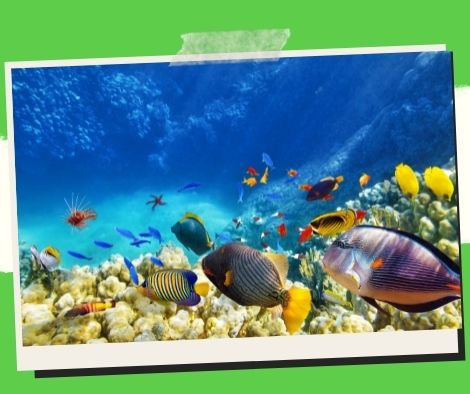
Changing to a Home Saltwater Aquarium from a Freshwater Aquarium
Because they have heard that saltwater aquariums are more difficult to maintain and call for specialized equipment, many people who would like to purchase and maintain saltwater aquariums shy away from them and opt for freshwater aquariums instead. That isn’t always the case. Most of the time, changing a freshwater tank to a saltwater tank is straightforward. With only a few major exceptions, the tanks’ equipment is largely the same. The aquarium substrate is one such exception. Tropical fish do better with a substrate comprised of living sand or broken coral rather than the gravel that your freshwater fish enjoyed. It’s important to keep in mind that the filter you’re using in your saltwater tank circulates water throughout the entire tank. The majority of filtering systems function well in both freshwater and saltwater environments, but many aquarium owners take advantage of the chance to upgrade their system. The amount of oxygen in the water is increased to its highest level by agitating the surface. You shouldn’t need to bother about improving your lighting system if you intend to maintain a fish-only aquarium. If you start adding coral reefs to your tank, it will be the only time the lights need to be upgraded.
Many aquarium enthusiasts erroneously believe that all it takes to turn their freshwater tanks into saltwater tanks is the addition of a little salt to the water. All they have done is set up a situation where any coral reefs, tropical fish, or freshwater fish that are put in the tank will perish. Freshwater bacteria and saltwater bacteria are totally distinct from one another. If someone wants to hasten the process of the water cycling, they should transfer some aquarium substrate from a warm saltwater aquarium to a temperate saltwater aquarium. Make sure you buy a refractometer and hydrometer to check the salinity of your water before adding fish to your newly converted tank. Between 1.020 and 1.026 should be the salinity’s specific gravity.
Rust is caused by saltwater. Regularly check your tank and filtration system. It’s time to replace your equipment if you see rust starting to appear.
Do some study before you start adding fish to your saltwater aquarium. Many tropical fish species have different dietary needs than their freshwater counterparts. In addition to fish flakes, several of these varieties need to be fed mixtures of fresh, frozen, and live food. You shouldn’t keep frozen food in your freezer for longer than three months. Finding Out What Kind of Arrangements Are Going to Be Needed If You Are Buying a Fish That Will Need a Lot of Live Food If You Are Buying a Fish That Will Need a Lot of Live Food
Because they have heard that saltwater aquariums are more difficult to maintain and call for specialized equipment, many people who would like to purchase and maintain saltwater aquariums shy away from them and opt for freshwater aquariums instead. That isn’t always the case. Most of the time, changing a freshwater tank to a saltwater tank is straightforward. With only a few major exceptions, the tanks’ equipment is largely the same. The aquarium substrate is one such exception. Tropical fish do better with a substrate comprised of living sand or broken coral rather than the gravel that your freshwater fish enjoyed. It’s important to keep in mind that the filter you’re using in your saltwater tank circulates water throughout the entire tank. The majority of filtering systems function well in both freshwater and saltwater environments, but many aquarium owners take advantage of the chance to upgrade their system. The amount of oxygen in the water is increased to its highest level by agitating the surface. You shouldn’t need to bother about improving your lighting system if you intend to maintain a fish-only aquarium. If you start adding coral reefs to your tank, it will be the only time the lights need to be upgraded.
Many aquarium enthusiasts erroneously believe that all it takes to turn their freshwater tanks into saltwater tanks is the addition of a little salt to the water. All they have done is set up a situation where any coral reefs, tropical fish, or freshwater fish that are put in the tank will perish. Freshwater bacteria and saltwater bacteria are totally distinct from one another. If someone wants to hasten the process of the water cycling, they should transfer some aquarium substrate from a warm saltwater aquarium to a temperate saltwater aquarium. Make sure you buy a refractometer and hydrometer to check the salinity of your water before adding fish to your newly converted tank. Between 1.020 and 1.026 should be the salinity’s specific gravity.
Rust is caused by saltwater. Regularly check your tank and filtration system. It’s time to replace your equipment if you see rust starting to appear.
Do some study before you start adding fish to your saltwater aquarium. Many tropical fish species have different dietary needs than their freshwater counterparts. In addition to fish flakes, several of these varieties need to be fed mixtures of fresh, frozen, and live food. You shouldn’t keep frozen food in your freezer for longer than three months. Find out what kind of arrangements will need to be made to keep the food alive before consumption if you are buying a fish that will require a lot of live food.
The majority of fish keepers advise getting a small tank that can serve as a quarantine tank. A sick fish’s chances of survival will increase and treatment will be simpler if it is kept in a quarantine tank. must be taken to preserve the food before consumption.
The majority of fish keepers advise getting a small tank that can serve as a quarantine tank. A sick fish’s chances of survival will increase and treatment will be simpler if it is kept in a quarantine tank.
Save/Share this story with QR CODE
Disclaimer
This article is for informational purposes only and does not constitute endorsement of any specific technologies or methodologies and financial advice or endorsement of any specific products or services.
 Need to get in touch?
Need to get in touch?

We appreciate your reading. 
1.) 

Your DONATION will be used to fund and maintain NEXTGENDAY.com
Subscribers in the Philippines can make donations to mobile number 0917 906 3081, thru GCash.
3.) 
4.) 
AFFILIATE PARTNERS

World Class Nutritional Supplements - Buy Highest Quality Products, Purest Most Healthy Ingredients, Direct to your Door! Up to 90% OFF.
Join LiveGood Today - A company created to satisfy the world's most demanding leaders and entrepreneurs, with the best compensation plan today.

 Business, Finance & Technology
Business, Finance & Technology





